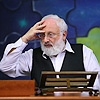It’s All About The Feelings
 Essentially, we have nothing more to learn except the concept of Arvut (mutual guarantee). Our entire life and everything that would help us on the way to another life, to another existence, everything is attained within the vessel called “Arvut.”
Essentially, we have nothing more to learn except the concept of Arvut (mutual guarantee). Our entire life and everything that would help us on the way to another life, to another existence, everything is attained within the vessel called “Arvut.”
The Creator created us with an egoistic desire to receive. This desire senses itself, thus we are, after all, vessels of sensations.
Prior to my coming to Rabash, I had studied Kabbalistic sources for a few years. I employed regular, rationalistic methods and tried to understand the material through the intellect as it is customary in other sciences. After all, the wisdom of Kabbalah is a science. But Rabash told me that in Kabbalah, it’s all a matter of feelings.
For me, “emotions” were something that lacked importance: Today I feel this way, and tomorrow I feel differently. I can drink a glass of wine and then life will be more cheerful, and I can listen to something sad and become sad myself. The emotions are something not real; they change, depending on the surroundings, on rumors, and many other factors.
I continued studying with Rabash and maintained the scientific approach: I used my intellect, but I used it on the emotions. The wisdom of Kabbalah researches the Light, goodness and pleasure, peace and movement, the overcoming, and drawing closer or distancing…. And all of this tells us what is happening within the desire. Although our work is calibrated according to various parameters, it is only in order to grasp and feel something within the desire. Our entire development has an emotional nature and is determined only according to the measure that we penetrate within our sensations.
Of course, feelings are accompanied by reason because we need to develop ourselves intellectually, consciously. When we feel something, we need to know how to measure this feeling, to be aware of what kind of sensation it is: Do we perceive it as external or internal, is it imaginary, how is it possible to examine it, and how do we go from current values and standards to other, more real values?
I need to objectively compare one with the other, outside of my current subjective feelings and understanding, which is called “above reason.” I begin to grasp that the “reason’’ is a vessel for the emotion, filled with the Light of Hassadim (Mercy) and the Light of Hochma (wisdom). When the Light of Hochma fills my vessels, my emotions, it gives me the facts, and the Light of faith enables me to broaden this “factual material” in me. But this way or the other, they are perceived within the sensation.
If a person penetrates a little deeper within the essence of his perception of his world, he understands that everything depends only on feeling. We are analog not digital systems.
When I served in the army, I discovered to my surprise that in the F15 jets, the instrument panels are full of indicator dials, despite that for the on-land equipment a digital control panel was used. The experts understand that man is an analog system. He can quickly identify situations, but not digits. When he quickly looks at the “control panel,” he immediately grasps their general picture. When it comes to the value of numbers, he has to translate them within himself into some sensation, while the dial on the scale automatically instills in him this feeling.
Hence, we are sensual creatures, and all of our lives are built on feeling. Even if we measure our life according to money, power, or control, at the end, all of this is only to reach a correct conclusion: We need to develop our real vessels, vessels of sensations.
The politicians, bureaucrats, or technocrats who use the scientific, rational, “digital,” approach seem to us quite respectable. It is as if it is not worthy of them to develop feelings. However, the technocrats are very limited. They still haven’t moved from their personal, simple calculations, like “two multiplied by two” to the essence of the calculations. By experiencing another few small crises, they will understand what they missed. This is the way children grow up. But in general, it is desirable that the intellect and the feelings will develop reciprocally in a person, in harmony.
[61250]
From the Daily Kabbalah Lesson 11/20/2011, “The Arvut (Mutual Guarantee)”
Related Material:
A Unified Agreement
From Words To Real Feelings
The Remedy For Helplessness

 Laitman.com Comments RSS Feed
Laitman.com Comments RSS Feed





Dr Laitman,
How do you feel now about using the words “keeping my thoughts and emotions together in one strong intention”. I want to say that my thoughts and my heart both form a feeling of love towards my friends! Is this statement correct according to your perception?